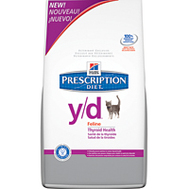 Hyperthyroidism is the most common hormonal abnormality in cats, causing the thyroid gland to become overactive and produce excess amounts of thyroid hormone. Fortunately, a more recent discovery has made the way to treat the disease easier for veterinarians, while also making the costs of treatment less expensive on the cat owner. Traditional treatments included radioactive iodine treatment to inactivate the tumor cells that cause excess secretion of thyroid hormone, or medication to suppress hormone secretion. Several years ago, it was found that a limited iodine diet was just as effective as the traditional methods of treating hyperthyroidism in cats. The solution was revolutionary and substantially reduced the costs of treating this condition. Hyperthyroidism and Limited Iodine Diets for Cats The thyroid hormone regulates body metabolism. Older cats with microscopic tumors of the thyroid gland secrete excess thyroid hormone, which increases metabolism. This excess secretion results in an increased appetite with weight loss. Affected cats often beg for more food and arouse owners late at night with howls of hunger. These cats also drink lots of water and have increased urination. The increased metabolic rate also causes an increased heart rate and an eventual heart murmur due to heart malfunction. The increased metabolic rate also affects kidney function and these cats are often in secondary kidney failure when the condition is diagnosed. Recent research found that limiting iodine in the diet of hyperthyroid cats decreased thyroid hormone production and the resulting harmful side effects. This treatment approach was more affordable and as reliable as the traditional treatment methods. The proof is in the research. Research Findings on Limited Iodine Diets for Cats A study published in the International Journal of Applied Research last year (A Restricted Iodine Food Reduces Circulating Thyroxine Concentrations in Cats with Hyperthyroidism) found that after being fed a limited iodine diet over a 12-week period, half of the cats with hyperthyroidism at the beginning of the study were euthyroid, or had normal thyroid gland function. The randomized and blinded study enrolled 33 cats – 18 on the restricted iodine diet and 15 in the control group. These results show that over 12 weeks, feeding a limited iodine food reduces serum thyroid hormone concentrations in hyperthyroid cats without negatively affecting other measures of health. Feeding a limited iodine food warrants further study as a treatment option for feline hyperthyroidism. Will Limited Iodine Diets Harm My Other Cat(s)? At the Academy of Veterinary Internal Medicine Symposium last year, I had an opportunity to meet with scientists who had developed the limited iodine diet and had done research into the effects of this diet on normal cats. Their findings were extremely encouraging. Admittedly, their research population was limited, with 15 cats receiving a diet with adequate iodine and 15 receiving limited amounts of iodine. But they did extend the research period to 18 months. This is far longer than most nutritional studies. Their findings concluded that no health problems were noted for healthy cats on a limited iodine food. The researchers admit that longer studies are necessary to conclusively prove that iodine-deficient diets are safe for normal cats. However, this research suggests that owners of a hyperthyroid cat in a multi-cat household do not have to make Herculean efforts to ensure dietary segregation and can even feed the same food for all members of the household. Of course, caution should be taken for kittens exposed to limited iodine diets. Their sensitivity could certainly result in problems and access to limited iodine foods should be restricted until research in this group has been conducted. Source: PetMD / Dr. Tudor A Peaceful Farewell provides compassionate at home pet euthanasia to fellow pet owners in Chandler, Gilbert, Mesa, Tempe, Ahwatukee, Scottsdale, and most of the Greater Phoenix Metropolitan Area.
0 Comments
Leave a Reply. |
The PAW Blog...
For the LOVE of Pets The goal of this blog is to help educate pet owners by sharing pet health facts and pet news articles...and ... sometimes put a smile on your face with a cute or funny pet story! Categories
All
Archives
July 2024
Search for any topic...
|

 RSS Feed
RSS Feed

